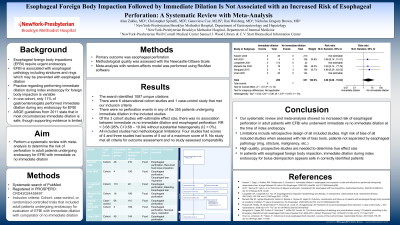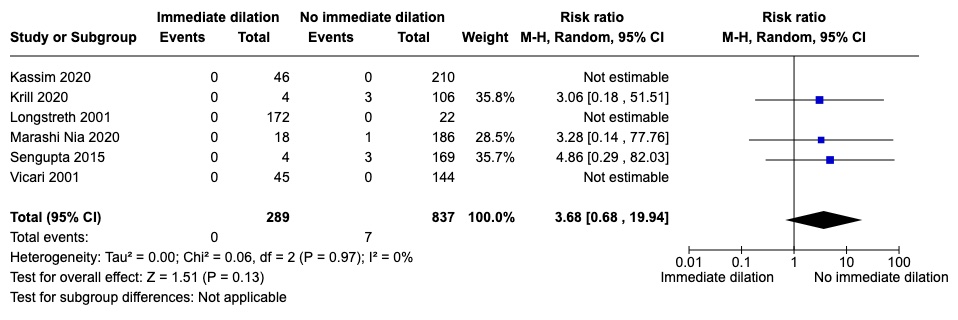Tuesday Poster Session
Category: Esophagus
P3904 - Esophageal Foreign Body Impaction Followed by Immediate Dilation Is Not Associated With an Increased Risk of Esophageal Perforation: A Systematic Review With Meta-Analysis
Tuesday, October 29, 2024
10:30 AM - 4:00 PM ET
Location: Exhibit Hall E

Has Audio
- AZ
Alan Zakko, MD
New York-Presbyterian Brooklyn Methodist Hospital
Ny, NY
Presenting Author(s)
Alan Zakko, MD1, Christopher M. Spinelli, MD2, Genevieve Coe, MS3, Ilan Weisberg, MD2, Nicholas G. Brown, MD2
1New York-Presbyterian Brooklyn Methodist Hospital, Ny, NY; 2New York-Presbyterian Brooklyn Methodist Hospital, Brooklyn, NY; 3New York-Presbyterian Weill Cornell Medical Center, Samuel J. Wood Library & C.V. Starr Biomedical Information Center, New York, NY
Introduction: Esophageal foreign body impaction requires urgent endoscopic evaluation for removal of the impacted foreign body. Its incidence is associated with esophageal pathology, including esophageal strictures and rings. Practice regarding performing immediate esophageal dilation during the index endoscopy is variable. Established guidelines indicate that, in most circumstances, it is safe to perform immediate esophageal dilation after foreign body impaction, which is based on limited observational trials. Given the scant evidence for this suggestion, our aim was to determine if immediate esophageal dilation in the same session as foreign body extraction is associated with esophageal perforation.
Methods: We performed a systematic search of PubMed. Inclusion criteria were adult patients undergoing endoscopy for evaluation of esophageal foreign body impaction with immediate dilation with the comparator of no immediate dilation. Our primary outcome was esophageal perforation. Methodological quality was assessed with the Newcastle-Ottawa Scale. Meta-analysis with random-effects model was performed.
Results: The search identified 1087 unique citations of which 6 observational cohort studies and 1 case-control study met our inclusion criteria. There were no perforation events in any patient undergoing immediate dilation in the included studies. Of the 3 cohort studies with estimable effect size, there was no association between immediate dilation and esophageal perforation: RR = 3.68 (95% CI 0.68 – 19.94) without substantial heterogeneity (I2 = 0%). All included studies had methodological limitations.
Discussion: Immediate esophageal dilation after esophageal foreign body disimpaction was not associated with an increased risk of esophageal perforation in our systematic review and meta-analysis.

Disclosures:
Alan Zakko, MD1, Christopher M. Spinelli, MD2, Genevieve Coe, MS3, Ilan Weisberg, MD2, Nicholas G. Brown, MD2. P3904 - Esophageal Foreign Body Impaction Followed by Immediate Dilation Is Not Associated With an Increased Risk of Esophageal Perforation: A Systematic Review With Meta-Analysis, ACG 2024 Annual Scientific Meeting Abstracts. Philadelphia, PA: American College of Gastroenterology.
1New York-Presbyterian Brooklyn Methodist Hospital, Ny, NY; 2New York-Presbyterian Brooklyn Methodist Hospital, Brooklyn, NY; 3New York-Presbyterian Weill Cornell Medical Center, Samuel J. Wood Library & C.V. Starr Biomedical Information Center, New York, NY
Introduction: Esophageal foreign body impaction requires urgent endoscopic evaluation for removal of the impacted foreign body. Its incidence is associated with esophageal pathology, including esophageal strictures and rings. Practice regarding performing immediate esophageal dilation during the index endoscopy is variable. Established guidelines indicate that, in most circumstances, it is safe to perform immediate esophageal dilation after foreign body impaction, which is based on limited observational trials. Given the scant evidence for this suggestion, our aim was to determine if immediate esophageal dilation in the same session as foreign body extraction is associated with esophageal perforation.
Methods: We performed a systematic search of PubMed. Inclusion criteria were adult patients undergoing endoscopy for evaluation of esophageal foreign body impaction with immediate dilation with the comparator of no immediate dilation. Our primary outcome was esophageal perforation. Methodological quality was assessed with the Newcastle-Ottawa Scale. Meta-analysis with random-effects model was performed.
Results: The search identified 1087 unique citations of which 6 observational cohort studies and 1 case-control study met our inclusion criteria. There were no perforation events in any patient undergoing immediate dilation in the included studies. Of the 3 cohort studies with estimable effect size, there was no association between immediate dilation and esophageal perforation: RR = 3.68 (95% CI 0.68 – 19.94) without substantial heterogeneity (I2 = 0%). All included studies had methodological limitations.
Discussion: Immediate esophageal dilation after esophageal foreign body disimpaction was not associated with an increased risk of esophageal perforation in our systematic review and meta-analysis.

Figure: Forest plot of esophageal perforation in included observational trials
Disclosures:
Alan Zakko indicated no relevant financial relationships.
Christopher Spinelli indicated no relevant financial relationships.
Genevieve Coe indicated no relevant financial relationships.
Ilan Weisberg indicated no relevant financial relationships.
Nicholas Brown indicated no relevant financial relationships.
Alan Zakko, MD1, Christopher M. Spinelli, MD2, Genevieve Coe, MS3, Ilan Weisberg, MD2, Nicholas G. Brown, MD2. P3904 - Esophageal Foreign Body Impaction Followed by Immediate Dilation Is Not Associated With an Increased Risk of Esophageal Perforation: A Systematic Review With Meta-Analysis, ACG 2024 Annual Scientific Meeting Abstracts. Philadelphia, PA: American College of Gastroenterology.
